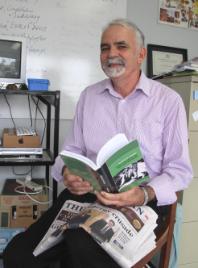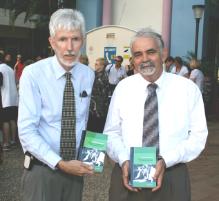Murdoch dynasty at a crossroads thanks to zeal for tabloids
Published on 19 July, 2011
Rupert Murdoch is likely to step into the breach to protect his beloved tabloids and hold back his sons' dynastic pretensions until News International recovers from the current phone-hacking scandal.
That's according to CQUniversity's Professor Denis Cryle, who has been interviewed by BBC Radio's Witness program, as an authority on the Murdoch culture in Australia. Award-winning BBC reporter Madeleine Morris*, formerly of ABC Capricornia, was keen to draw on Denis' experience as the author of Murdoch's Flagship: Twenty-five Years of The Australian Newspaper.
You'll be able to find the Witness program via www.bbcworldservice.com/witness
or here www.facebook.com/bbcwitness from Tuesday evening.
"News has taken a lot of bruises and a lot of hits. It's no doubt going to suffer but I think it's unlikely that pain is going to be spread equally across its different sites," Professor Cryle says.
"Because it is a multinational it has I think an in-built resilience. The real issue is whether the practices that have been occurring within the UK tabloids extend to other papers in the UK stable and whether those practices also extend overseas.
"I think there is some concern about that because the mobility of Murdoch executives suggests that people do move around a lot ... Murdoch doesn't distinguish between editorial chairs of his papers so people can move between popular papers to The Times and so on and with that I think goes a particular set of practices which may well create further problems."
Professor Cryle says Murdoch is in fact "partial to that kind of muck-raking journalism".
"When he went to the UK and started making a lot of money out of the British tabloids I think that really did change the way he viewed the world and I think to some extent even in this situation of adversity he probably sees himself as a hard-done-by tabloid journalist who's trying to do the right thing.
"I think that people don't understand Murdoch is a crusader as a journalist and to him that is the way of doing business, rather than providing independent commentary."
CQUniversity's media historian says there's been an unprecendented revolt from politicians after a weak regulatory period, during which both sides have courted Murdoch.
"If the scandal continues to spread it does provide the politicians with a great deal of ammunition and a very large stick."
Meanwhile, former ABC Regional Manager and now CQUniversity Adjunct Professor Ross Quinn added that the scandal may prove to be a ‘game changer' for the way the media operates.
"There's no doubt that the media has become increasingly intrusive into people's lives and this is paradoxically at a time when we're much more conscious of personal privacy and when it's generally much better protected than it used to be," Mr Quinn says.
"I think it's been a general wake-up call for the media and a clear demonstration that the public and governments, their democratically elected representatives, are not going to tolerate the behaviour that has been rife at the likes of 'The News of the World' in recent years.
"While some commentators have said publicly that the current level of public outrage will only be a temporary phenomenon and the tabloid media will soon be back to their old ways, I don't fully agree.
"We will always have scandal sheets but I think media outlet proprietors and their employees will be much more careful about the way they acquire and use information in the future.
"I think that there is also the possibility of contagion to the global Murdoch Empire and not the least reason being the huge financial liability of News Limited as more and more information about illegal access to personal information comes into the public domain.
"However, while the Murdoch operating model in Australia is very similar to the UK with both quality and mass circulation publications, there seems to have been a greater level of restraint shown here than in the UK where the scandal sheets have been notorious, leading to Rupert Murdoch being dubbed the ‘Dirty Digger' many years ago.
"What's not being said however is that while it's entirely legitimate to criticise Rupert Murdoch for the ‘News of the World' behaviour, we also shouldn't forget the public contribution he's made through his quality News Limited newspapers both here in Australia and abroad.
"There's no doubt that The Australian for all its flaws and real and perceived biases political and otherwise, has made a made a major contribution in the area of quality journalism over many years and has done this while continually making a loss."
Professor Cryle agrees The Australian has gone through periods of 'attack dog journalism' and says there's a strong case for better-funded research into media bias.
# # #
* Madeleine Morris began her media career at the ABC in Rockhampton in 1999 after being recruited by Ross Quinn. She joined the BBC's World Service in 2000 and has since gone on to become a highly respected radio and TV reporter there. Some of her career highlights include a stint as a BBC Washington correspondent in the last few years and as a BBC World Service radio commentator for the recent royal wedding. She also won a prestigious ‘One World' media award very recently for a BBC TV ‘Newsnight' (their equivalent to the ABC's Lateline) story on the ‘meltdown' or abuses prevalent in the micro finance industry in India and the Indian sub-continent: http://news.bbc.co.uk/1/hi/programmes/newsnight/9369880.stm .



